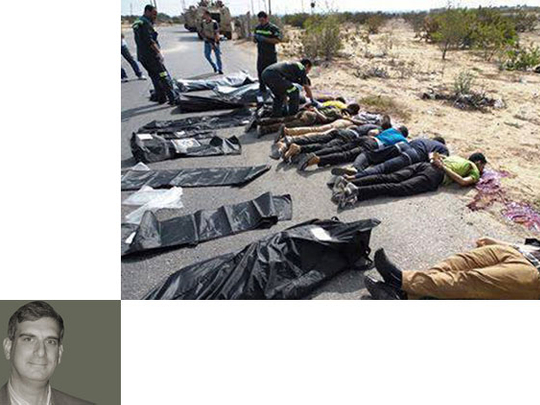
There are many deeply unsettling things about the violence in Egypt, but perhaps the most striking is how similar the rhetoric from both sides often is.
Throughout his year in office, Mohammad Mursi, though democratically elected, never seemed to accept the idea of legitimate opposition. He demonised his opponents as traitors and foreign agents. In this, as much as in his repeated grabs for ever-more power on behalf of the Muslim Brotherhood, he consistently alienated potential allies in Egypt’s opposition.
Today, with Mursi deposed and detained, the generals who ousted him justify their blood-soaked crackdown by describing demonstrators opposed to military rule as terrorists. The danger for both sides is that as the rhetoric escalates, and the body count rises, retreat and compromise become more difficult by the hour.
The question historians are likely to struggle with as they look back on the last two weeks is whether either side wanted or expected things to play out this way.
Egypt’s military rulers “were itching for a fight,” in the words of US Senator Lindsay Graham who met Defence Minister and coup leader General Abdul Fattah Al Sissi just before the crackdown began. The generals may well have believed that a huge show of force would intimidate their opponents and put a quick end to the protests.
With hindsight, it is easy to say that the soldiers vastly underestimated the Muslim Brotherhood’s resolve, but was it really all that hard to anticipate that Mursi’s supporters would stand and fight? By the same token, did the Brotherhood’s leadership really not understand that their efforts to establish an elected Islamist dictatorship were bound to alienate a lot of Egyptians — especially the military?
Behind the rhetoric each side deploys (‘we alone are patriots; our opponents are traitors and terrorists’) are myths that are both narrow and dangerously self-serving.
In the heady days of the original Tahrir Square uprising, the crowds chanted: “The People and the Army are One!” It did not, however, take much digging to discover that Egypt’s people and its army had fewer common interests than both appeared to assume.
In the four decades since it last fought a war, the Egyptian military has evolved into a business conglomerate. It still does military stuff, of course, but it also runs hotels, resorts and department stores. It manufactures a range of consumer goods. By some estimates, it directly controls more than one-third of the country’s economy. It is accustomed to doing these things by itself — free of civilian interference. Throughout the negotiations and legal and parliamentary manoeuvring of the last two-and-a-half years, the military’s most important non-negotiable demand has been the preservation of its economic independence.
To be fair, one must also acknowledge that Egypt’s military leaders seem genuinely to believe that the vast majority of their countrymen support this state of affairs — that when they chanted “The People and the Army are One” they were endorsing the military’s desire to hold onto its privileged, autonomous status. The military seems equally sure that expressions of support for the army as an institution are also endorsements of its view of the Muslim Brotherhood as a dangerous organisation bent on altering Egyptian society (by, among other things, lessening the role of the military in the country’s politics and economics).
Just as the army has confused popular support with universal endorsement of its view of itself, so has the Brotherhood confused victory in an election with a wholesale mandate to remake the country in its own image.
When Mursi defeated Ahmad Shafik for the Egyptian presidency last year, it was clear that he benefitted from the votes of many people who regarded him as the least-bad choice in a run-off that seemed to pit the Tahrir Square revolution against loyalist holdovers from the Mubarak era. Within the Brotherhood, however, that victory appeared to validate their deeply held belief that because most Egyptians are Muslims they are, by default, supporters of the Muslim Brotherhood.
An outsider can observe that both of these ideas are self-serving and carry a whiff of megalomania. Yet, they are both sincerely held and among the most important root causes of Egypt’s current political crisis.
Each side believes that it, and it alone, represents and channels the popular will. As a result, each side is equally certain it enjoys overwhelming popular support and that only a tiny minority backs its opponent. The same cast of mind that first led the Brotherhood to overplay its hand is now leading the generals to overplay theirs. This kind of moral certitude is toxic. More than anything else, this is what is causing the country’s politics to spin out of control.
The danger is that we may already have passed a point of no-return — that too much blood has been shed for either side to retreat from what each sees as matters of existential principle. Egypt is staring into an abyss. But make no mistake: Its potential downfall lies not in terrorists or foreign plots, but rather in leaders — on all sides — too ready to believe their own propaganda.
Gordon Robison, a longtime Middle East journalist and US political analyst, teaches Political Science at the University of Vermont.












